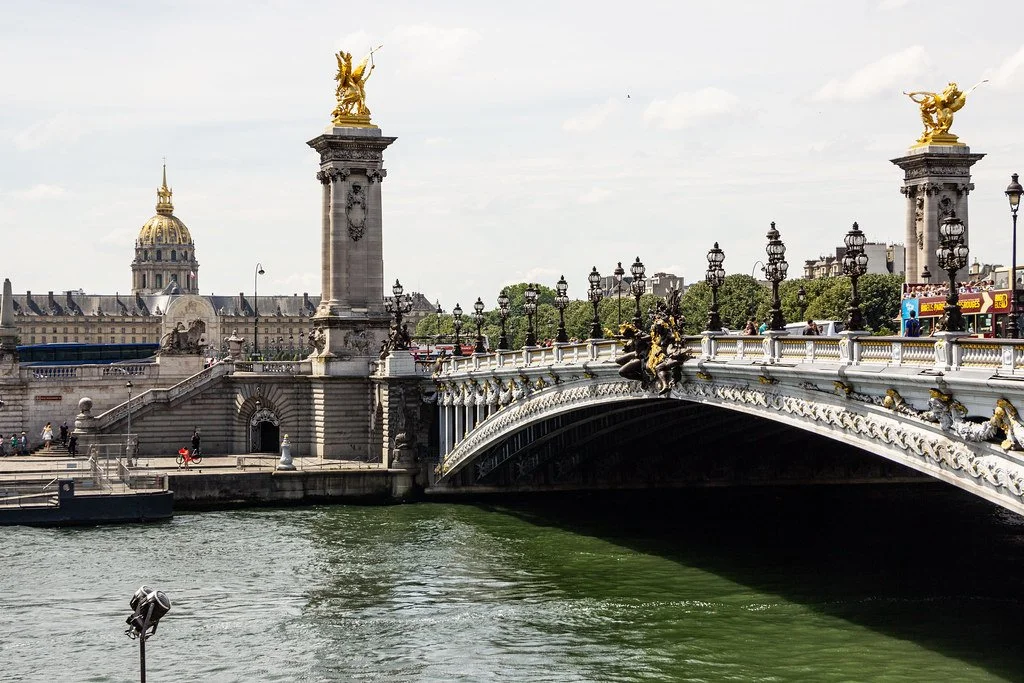Officials of the French government are trying to clean the Seine, which has been deemed unswimmable for a century, in time for the 2024 Summer Olympics swim competition.
Pont Alexandre III on the River Seine, Billy Wilson, CC BY-NC 2.0
With the 2024 Olympics set for Paris, the French government has faced backlash for its efforts to quickly clean the Seine, the main river that runs through Paris. The Seine is approximately 13 kilometers long and, in Paris, accompanied by 37 bridges. The staple has promoted water travel and inspired classic French songs such as, “Sous le Pont Mirabeau” and “Sous les Ponts de Paris.” The Seine also has a long history of supplying water to Parisians. In Medieval Paris, citizens and street vendors would collect water from the Seine before they had access to running water. In 1802, Napoleon constructed the Canal St Martin connecting the Seine to the Bassin de La Villette with the goal of supplying water via public fountains throughout the city. The River Seine was in wide use, with people engaging in walks along its banks and recreational swimming, until a decree was passed in 1923 that banned such activities due to pollution and waste runoff. News Writer Olivia Craighead explains that, “The city is old as hell, and as such, sometimes sewage ends up in the Seine.” While people are still allowed to visit its banks, the River Seine has been closed to swimmers since the decree. Until the announcement of the 2024 Olympics.
Since the 2008 Olympics, there have been two open water swimming events: the triathlon and the 10k marathon swim. Pierre Rabadan, the deputy mayor in charge of sports, Olympics, and Paralympics, has said that, “Our objective is an Olympic legacy.” In 2015, Paris introduced the "Plan Baignade" (“Swimming Plan” in English), a plan to make the river swimmable for the Olympics and regular citizens by 2024. As a result, the government has invested upwards of $1.5 billion to make their plan a reality. Despite their efforts, test results from the week of June 10 reveal that E. coli levels in the river are over twice the maximum allowed in water for Olympic events. Marc Guillame, a top government official for Paris, says that these recent readings “are not in line with the standards we will have in the summer.” With the Seine, most bacteria is killed with sunlight and warm temperatures, both of which Paris has seen very little of at this point in the summer. Instead, it has endured heavy rain and cloudy conditions. Phillippe Leclercq, an 18 year old living on a houseboat on the River Seine, notes that, “When it’s good, it’s a nice green color, lately it’s just been brown.”
To ease concerns citizens and athletes have about the River Seines’ cleanliness, President Emmanuel Macron and Mayor of Paris Anne Hidalgo have pledged to be the first swimmers. Originally scheduled to take a dip on June 23, the two have moved their swim back to July 14. Hidalgo stresses that this was not due to the condition of the water, but the current weather and political atmosphere: “Yes, I will swim in the River Seine, not now because the weather is not so well in Paris, but also because we have an election. It is not possible to organize the jump to the river during the election.”
Aanya Panyadahundi
Aanya is a student at the University of Michigan studying sociology and journalism on a pre-law path. She loves to travel the world whenever she can, always eager to learn more about the different cultures and societies around her. In her free time, she likes to play the violin, ski, and listen to podcasts


